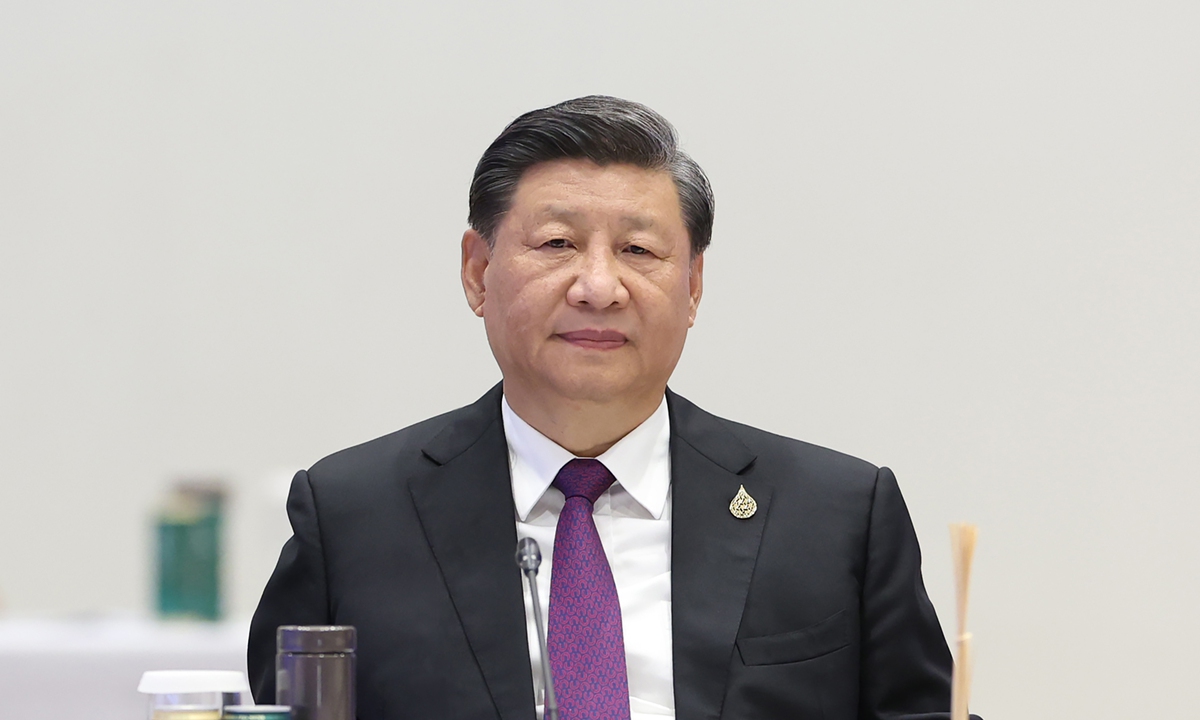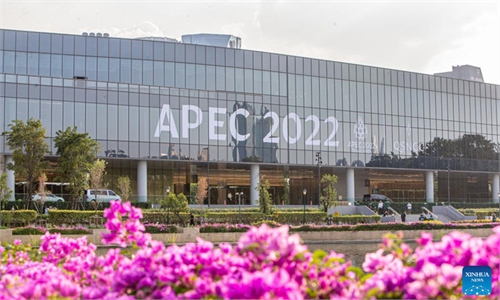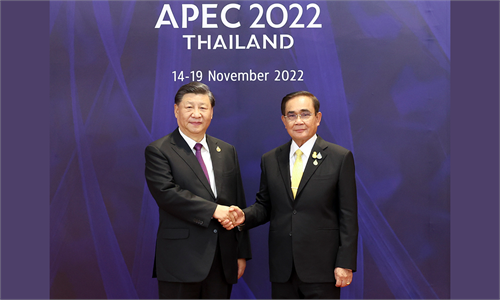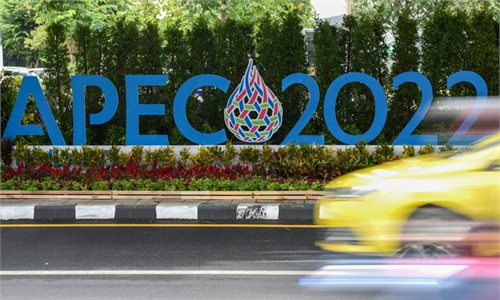China sets example as major country in this round of head-of-state diplomacy: Global Times editorial

Chinese President Xi Jinping delivers a speech titled "Shouldering Responsibility and Working Together in Solidarity to Build an Asia-Pacific Community with a Shared Future" at the 29th Asia-Pacific Economic Cooperation (APEC) Economic Leaders' Meeting in Bangkok, Thailand, Nov. 18, 2022.Photo: Xinhua
Chinese President Xi Jinping delivered a speech titled "Shouldering Responsibility and Working Together in Solidarity to Build an Asia-Pacific Community with a Shared Future" on Friday at the 29th Asia-Pacific Economic Cooperation (APEC) Economic Leaders' Meeting. In the speech, he put forward China's proposition on what kind of Asia-Pacific to build from the perspectives of peace and stability, prosperity for all in the Asia-Pacific, a clean and beautiful Asia-Pacific, as well as helping each other. Xi also expressed China's willingness to commit to building new systems for a higher-level open economy and continue to share China's development opportunities with the world, especially the Asia-Pacific. These farsighted and realistic remarks are highly in line with the common expectations of the regional and international community, and have resonated greatly both inside and outside the venue.
The APEC meeting is the last of the three important meetings of the "Asian moment," and continues a prominent feature of the first two events: The participants share many similarities in their perceptions and elaboration of major regional and international issues. Even US Secretary of State Antony Blinken said he saw signs of a "convergence" in views about how to move forward in solving the world's problems. This is a positive sign that makes us more confident in the future of mankind. It demonstrates that the consensus in the Asia-Pacific region and even the entire world still outweighs the differences and divisions that have been greatly exaggerated by some US and Western media. When the international situation is more tense, the "justice" lurking in the minds of world will come to the fore, promoting the establishing and strengthening of dams to maintain peace and stability, as well as fairness and justice.
We have seen from the three meetings that at a time of complex and severe global challenges, it is entirely possible to realize solidarity in human society, and the key is that major countries should set an example. The host of the APEC meeting, Thai Prime Minister Prayut Chan-o-cha, urged APEC leaders to focus on building a sustainable and inclusive world. French President Emmanuel Macron said bluntly in his speech that an increasing number of countries were being put in a position where they had to choose between an allegiance to Beijing or Washington, and "this is a huge mistake." Although he didn't say who was responsible, everyone on Earth knows it. The US will face increasing pressure from international public opinion and morality for stirring camp confrontation in the Asia-Pacific and building "small yard, high fence," and it is doomed to fail.
In fact, this kind of overall atmosphere has now formed an invisible constraint on the US. Vice President Kamala Harris' speech on Friday was much more restrained than what the US media had previously disclosed. She did not put the focus on attacking China. She yelled the stale slogan "there is no better economic partner for this region than the US," repeated old tunes such as "against market distortions and unfair competitive advantages" and "economic coercion," but avoided directly mentioning China. The reluctance to be in defiance of universal condemnation is probably one of the important reasons behind her decision.
Nevertheless, the headline of a Bloomberg report still said that Harris seeks to "coax" Asia, which shows that the true intentions of the US to the Asia-Pacific region are no secret. The Asia-Pacific region has become subconsciously wary of US geopolitical manipulation, and the struggle against US hegemony will gain wider support.
The Asia-Pacific region is where we live and thrive, and also the source of global economic growth. The more turbulent the storm is, the more care should be taken for the prosperity of the common development of the Asia-Pacific.
Although the three conferences have their own specific themes, "overcoming divergences," "realizing unity" and "seeking development" have become the consistent theme of this "Asian moment." Whoever practices true multilateralism and who truly closely links one's own destiny with regional development will have a wider path and make more friends. China has never "competed for friends" with the US in the Asia-Pacific region or anywhere else, but the law of nature will eventually play out.
This round of China's head-of-state diplomacy has gained a more comprehensive understanding and appreciation of China's diplomacy around the world. President Xi held meetings with leaders of more than 10 countries and international organizations, increasing trust and dispelling doubts, and this is leading the development of bilateral relations. The important speeches at the G20 Bali Summit and the APEC meeting had far-reaching influence.
It is obvious that China's proposition is highly consistent with the mainstream opinion of the international community. In the face of a turbulent and changing world, China has always maintained and practiced true multilateralism, and has always stood on the right side of history, on the side of peace, cooperation, fairness and justice, and on the side of human civilization and progress. This determines that China's circle of friends will become increasingly big.



